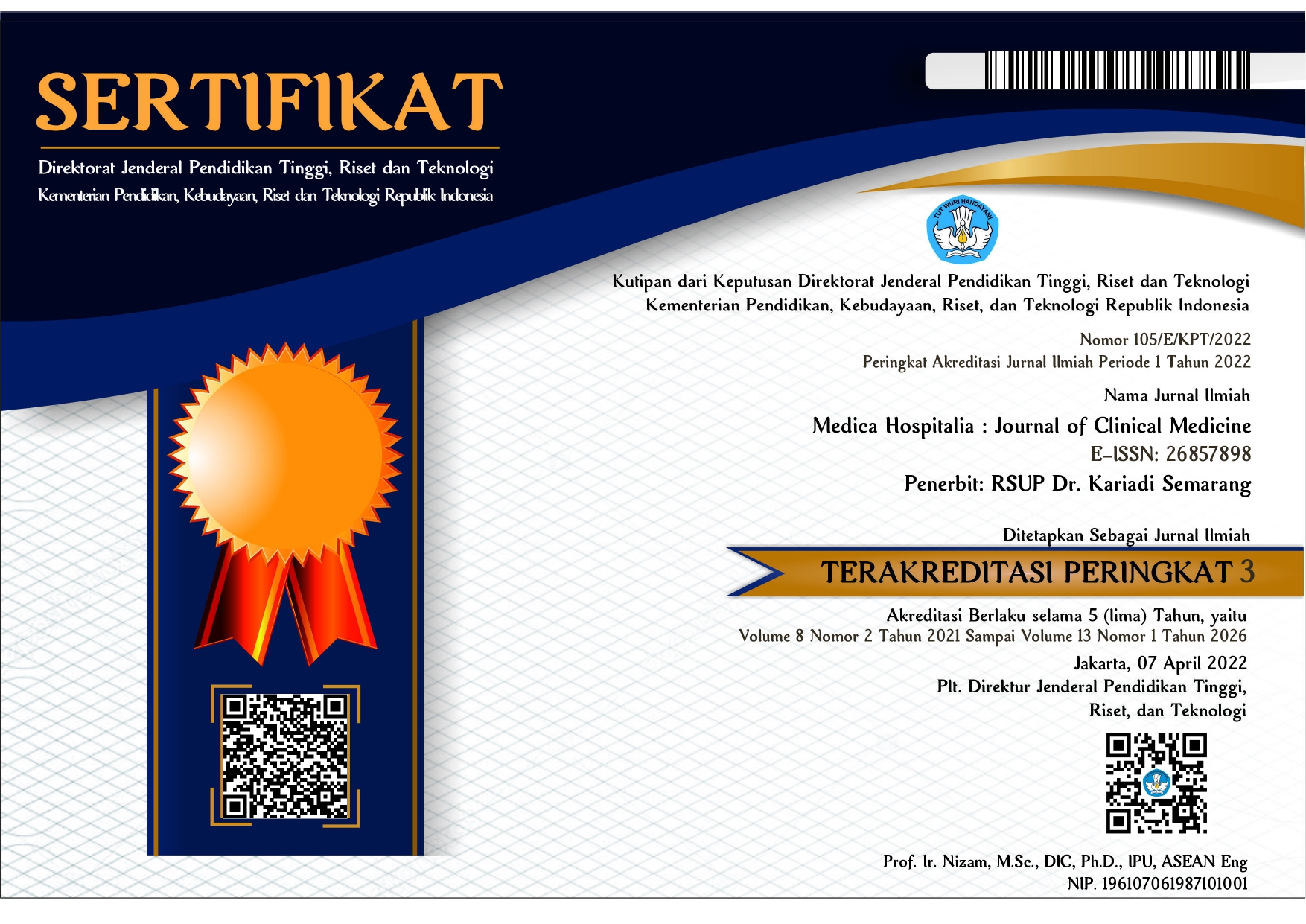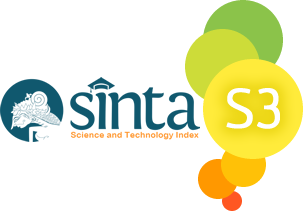Gangguan Neuropsikiatri Paska Kemoterapi Ifosfamid
DOI:
https://doi.org/10.36408/mhjcm.v8i1.575Keywords:
Ifosfamid, neuropsikiatri, neurotoksisitas, kloroasetaldehidAbstract
Latar belakang: Reaksi obat yang merugikan (adverse drug reaction) sering muncul salah satunya pada obat-obat sitostatika. Ifosfamid adalah obat sitostatika golongan pengalkil yang ketika dimetabolisme akan membentuk senyawa aktif nitrogen mustard sitotoksik. Selain itu ia juga membentuk senyawa lain yaitu akrolein dan kloroasetaldehid. Akrolein yang bersifat urotoksik ini dengan mudah akan diikat oleh mesna, sedangkan kloroasetaldehid bersifat neurotoksik yang hingga sampai saat ini masih menjadi masalah karena keterbatasan panduan untuk anti dotumnya.
Kasus: Kami mendeskripsikan 3 pasien dengan diagnosis berbeda yang mengalami gangguan neuropsikiatri paska kemoterapi ifosfamid yaitu kanker saluran empedu dengan mengantuk berat, kanker ovarium residif dengan halusinasi, dan tumor ganas pelvis dengan penurunan kesadaran disertai kejang.
Pembahasan: Gangguan neuropsikiatri dapat disebabkan oleh neurotoksisitas dari hasil metabolisme dari ifosfamid yaitu kloroasetaldehid yang secara langsung maupun tidak langsung merusak neuron (neurotoksik). Manifestasi klinisnya dapat bertingkat mulai dari kebingungan dan mengantuk hingga kejang, koma dan kematian. Onset munculnya gejala terutama hitungan jam hingga 2 hari setelah kemoterapi selesai. Terdapat faktor resiko munculnya neurotoksisitas yang teridentifikasi pada laporan kasus ini yaitu gangguan fungsi ginjal dan hipoalbumin. Beberapa penelitian mengatakan bahwa toksistas ini berifat reversible, demikian juga dengan pasien kasus pertama yang membaik setelah 24 jam, dan kasus kedua yang membaik setelah 5 hari, namun pemberian terapi spesifik tetap direkomendasikan pada NCI stadium III atau IV.
Kesimpulan: Gangguan neuropsikiatri paska kemoterapi ifosfamid dapat disebabkan oleh neurotoksisitas pada SSP akibat kloroasetaldehid dengan faktor resiko yaitu gangguan fungsi ginjal dan hipoalbumin. Diperlukan penelitian lebih lanjut untuk memastikan bahwa gejala neuropsikiatri yang muncul adalah murni karena ifosfamid, misalnya dengan melakukan pengukuran kadar obat di dalam darah.
Downloads
References
2. Al-Momen A, Farhan S, Anjum FA, Aleem A. Delayed ifosfamid-induced encepalopathy: a case report. J Appl Hematol. December 2010; IP:112.215.242.62.
3. Brade WP, Herdrich K, Varini M. Ifosfamid pharmacology, safety and therapeutic potential. Cancer Treat Rev. 1985; 12, 1-47.
4. Cancer care [Internet]. Cancer care chemotherapy. Cancer care; 2016 [cited 2019, February 19]. Available from: file:///G:/2016-08 23_cancercare_chemotherapy_booklet2.pdf.
5. Chatton JY, Idle JR, Vagbo CB, Magistretti PJ. Insights into the mechanisms of ifosfamid encephalopathy: drug metabolites have agonistic effects on alpha-amino-3-hydroxy-5-methyl- 4-isoxazolepropionic acid (AMPA)/kainate receptors and induce cellular acidification in mouse cortical neurons. J Pharmaco Exp Ther. December 2001; 299,1161–1168.
6. Cheung MCM, Jones RL, Judson I. Acute liver toxicity with ifosfamide in the treatment of sarcoma: a case report. JMCR. May 2011; 5:180.
7. Curigliano G, Cardinale D, Dent S, Criscitiello C, Aseyev O, Lenihan D, et al. Cardiotoxicity of anticancer treatments: epidemiology, detection, and management. Ca Cancer J Clin. 2016; 66:309–325.
8. Dringen R. Metabolism and functions of glutathione in brain. Prog Neurobiol. December 2000; 62 649-671.
9. Leporini C, De Sarro G, Russo E. Adherence to therapy and adverse drug reactions: is there a link?. Expert Opin Drug Saf. 2014; 13 (suppl 1): S41-S55.
10. Lerch S, Kupfer A, Lauterburg BH. Cerebral formation in situ of S-carboxymethylcysteine after ifosfamide administration to mice: a further clue to the mechanism of ifosfamide encephalopathy. Toxicol Lett. March 2006; (3): 188-94.
11. Ling-Gong Q, Fen-Ma, Chai Y. A case of ifosfamide encephalopathy and its literature review. Med Case Rep. July 2018; 3:82.
12. Mashhadi M, Khosravi A. Neuropsychiatric toxicity of Ifosfamid in patients admitted for chemotherapy. IJHOSCR. January 2010; 4(1): 19-2.
13. McVay JI, Wood AM. Suspected ifosfamid-induced neurotoxicity. Pharmacother. 1999; 19:1450e1455.
14. Pelgrims J, De Vos F, Van den Brande J, Schrijvers D, Prove A, Vermorken JB. Methylene blue in the treatment and prevention of ifosfamide-induced encephalopathy: report of 12 cases and a review of the literature. BJOC. January 2000; 82(2), 291–294.
15. Rooseboom M, Commandeur, JN, Vermeulen NP. Enzyme catalyzed activation of anticancer prodrugs. Pharmacol Rev. March 2004; 56:53-102.
16. Sattler R, Tymianski M. Molecular mechanism of glutamate receptor-mediated exitotoxic neuronal cell death. Mol Neurobiol. August-December 2001; 24(1-3):107-29.
17. Sejourne A, Noal S, Boone M, Bihan C, Sassier M, Andrejak M, et al. Two cases of fatal encephalopathy related to ifosfamide: an adverse role of aprepitant?. Case Rep Oncol. September 2014; 7:669-672.
18. Shadle CR, Lee Y, Majumdar AK, Petty KJ, Gargano C, Bradstreet TE, et al. Evaluation of potential inductive effects of aprepitant on cytochrome P450 3A4 and 2C9 activity. J Clin Pharmacol. March 2004; 44:215–223.
19. Shin YJ, Kim JY, Moon JW, You RM, Park JY, Nam JH. Fatal ifosfamide metabolic encephalopathy in patient with recurrent epithelial ovarian cancer: report two case. Cancer Res Treat. December 2011; 43(4):260-263.
20. Sweiss KI, Beri R, Shord SS. Encephalopathy after high-dose ifosfamide: a retrospective cohort study and review of the literature. Drug Saf. November 2008; 11,989-996.
21. Takamoto S, Sakura N, Namera A, Yashiki M. Monitoring of urinary acrolein concentration in patients receiving cyclophosphamide and ifosfamide. J Chromatography B. March 2004; 804 59-63.
22. Vakiti A, Pilla R, Moustafa MA. Ifosfamid-induced metabolic encephalopathy in 2 patients with cutaneous t-cell lymphoma successfully treated with methylene blue. JIMHICR. June 2018; Volume 6: 1-4.
23. Zhang J, Tian Q, Zhou S. Clinical pharmacology of cyclophosphamide and ifosfamid. Curr Drug Ther. January 2006; 1,55-84.
Additional Files
Published
How to Cite
Issue
Section
Citation Check
License
Copyright (c) 2021 Medica Hospitalia : Journal of Clinical Medicine

This work is licensed under a Creative Commons Attribution-ShareAlike 4.0 International License.
Copyrights Notice
Copyrights:
Researchers publishing manuscrips at Medica Hospitalis: Journal of Clinical Medicine agree with regulations as follow:
Copyrights of each article belong to researchers, and it is likewise the patent rights
Researchers admit that Medica Hospitalia: Journal of Clinical Medicine has the right of first publication
Researchers may submit manuscripts separately, manage non exclusive distribution of published manuscripts into other versions (such as: being sent to researchers’ institutional repository, publication in the books, etc), admitting that manuscripts have been firstly published at Medica Hospitalia: Journal of Clinical Medicine
License:
Medica Hospitalia: Journal of Clinical Medicine is disseminated based on provisions of Creative Common Attribution-Share Alike 4.0 Internasional It allows individuals to duplicate and disseminate manuscripts in any formats, to alter, compose and make derivatives of manuscripts for any purpose. You are not allowed to use manuscripts for commercial purposes. You should properly acknowledge, reference links, and state that alterations have been made. You can do so in proper ways, but it does not hint that the licensors support you or your usage.

























